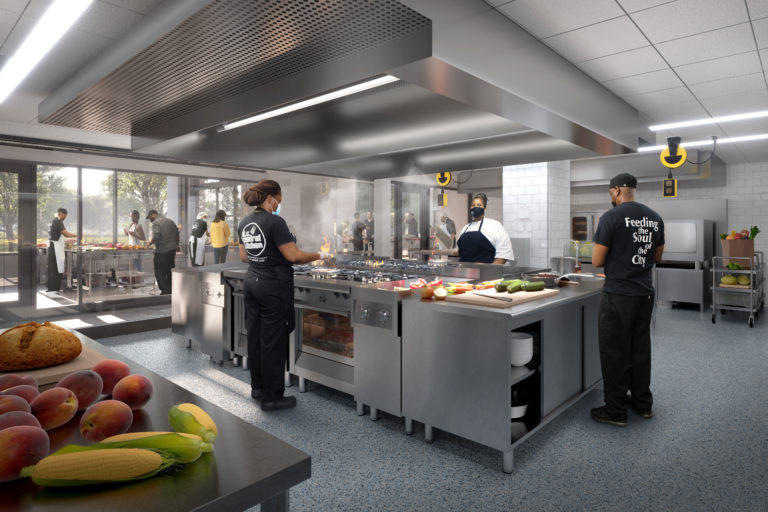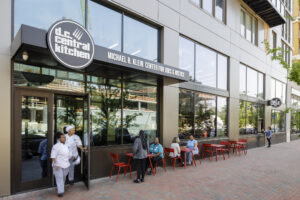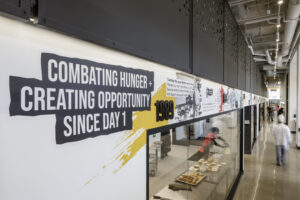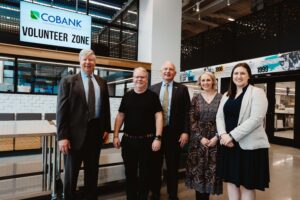The J. Willard and Alice S. Marriott Foundation is one of DC Central Kitchen’s longest-tenured supporters. From supporting our pandemic relief efforts to sponsoring the education of more than 270 Culinary Job Training students over 13 classes since 2008, the Foundation has been at our side through recessions, natural disasters, and even a pandemic. The Foundation, in concert with Marriott International, made a pivotal and catalytic early-stage investment in the Bringing the Kitchen Home Campaign with a $5 million commitment. We are honored to recognize their enduring partnership via the Marriot Culinary Job Training Kitchen, the beating heart of the forthcoming Klein Center for Jobs and Justice. We sat down with Jen Lawrence, Foundation Program Officer, to get her thoughts on our project and long-standing collaboration:
As longtime supporters of DC Central Kitchen, how has The J. Willard and Alice S. Marriott Foundation seen our job training and food access programs make an impact in our community through the years?
It has been an honor to fund the work of DC Central Kitchen over the past 21 years. DCCK is an important thread in the city’s workforce, food security, and community building fabric—all areas of focus for the Foundation.
The Foundation has been privileged to a front row seat, watching DCCK evolve its work and craft effective and sustainable solutions that address issues of hunger and poverty. The evolution of DCCK’s approach uniquely and smartly pairs food with access and opportunity. And, frankly, it has been easy to champion and fund these activities and innovative programs that help bridge gaps in employment and food access—it just makes sense.
DCCK uses food as an agent of change to transform the lives of residents who are most in need. It has been inspiring to watch the growth and development of the culinary jobs training program that creates pathways for residents who face employment barriers by equipping them with professional skills and resources to enter the hospitality industry. This type of program is critical to help build and sustain the region’s local hospitality workforce system.
DCCK has been thoughtful in its approach to mobilize resources and harness the power of partnerships to disrupt food barriers and meet the urgent needs of residents. The pandemic shined a light on the region’s food infrastructure and the important role organization’s like DCCK play on the frontlines.
How do you envision DC Central Kitchen’s new home at the Klein Center for Jobs and Justice fitting into the future of DC’s hospitality sector and food system?
We applaud the incredible work Mike Curtin and the team has accomplished while operating in the current space—a much tighter footprint, which speaks to DCCK’s remarkable adaptability and agility to effectively organize and execute despite space limitations.
With more physical space, DCCK has the potential to unlock significant capacity and maximize impact for DC’s hospitality industry and food system. The expanded footprint will allow more students to participate in the Culinary Job Training program (CJT) and, subsequently, produce more graduates to fill talent pipelines. This is especially critical today as the hospitality industry faces crisis level labor shortages brought on by the pandemic.
The Foundation has been a part of and, in some cases, has led discussions with the broader hospitality community about the lack of diversity in the industry and the need for a more equitable and inclusive culture. While those discussions have been encouraging, it is clear that there is still more ground to cover. DCCK, by way of the CJT program, is uniquely positioned to drive deeper discussions around these issues as the organization centers and uplifts a diverse set of voices, and has a unique proximity and lens through which the industry can filter and rethink how it attracts, recruits, and retains employees.
The expanded footprint will also allow DCCK to increase capacity to prepare and deliver more fresh, healthy meals for residents, schools, retail markets, catering operations, and the like. Rates of food insecurity and hunger remain high across the region as a result of the pandemic and its economic consequences. The new and improved space will play an important role in helping to meet the increased demands and pressures on the food system.
Other systemic issues related to the volatile food supply chain, supplier diversity, and environmental and agricultural justice also emerged during the pandemic. We envision the new facility serving as a hub for community members and leaders to convene, build, and cultivate relationships and find solutions that ultimately strengthen DC’s food resiliency plans and long-term sustainability.
What are you most excited to see and be a part of in our new space? Why was investing in the Marriott Culinary Job Training Kitchen so important to you?
We are most excited about a few things:
First, to see how the new space will transform DCCK’s operations and amplify the organization’s three decades plus of phenomenal work. The state-of-the-art production kitchen and training spaces alone will be a game changer for the culinary program students and staff and volunteers who are preparing and packaging meals. Investing in the new kitchen space was important for the Foundation because the expansion will enable both the culinary training program and the food access work to scale in terms of number of students enrolled and embarking on meaningful hospitality careers and the number of clients served. And if these programs scale so to do solutions to hunger, food insecurity, and workforce development.
Second, to see how the space will both activate and celebrate community, creating a real sense of place and purpose for residents of the Buzzard Point community, staff, and DCCK clients.
Finally, we believe physical space matters. The DCCK community deserves a home that is worthy of the mission-critical work being done inside of it.
Please join us in thanking The J. Willard and Alice S. Marriott Foundation for their transformational support!



